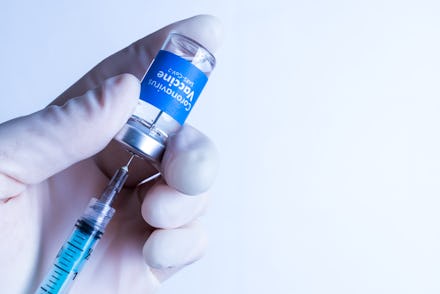New York will finally offer vaccines to all inmates, after a judge's order

The coronavirus vaccine rollout has been hectic, to put it mildly. Many have argued for vulnerable populations to be prioritized for the shots, but what exactly qualifies as "vulnerable" has largely been left to individual states. The problems with this were illuminated in states like New York, where officials left people in jails and prisons out of the rollout plan, despite the well-documented fact that carceral facilities are hotbeds for viral spread. But this week, a judge ruled that New York must begin vaccinating incarcerated people in a move widely celebrated by activists.
Problems began brewing for New York when the state entered Phase 1B of its vaccine distribution. Correctional staff like parole officers and prison guards were included within guidelines — but not incarcerated people themselves. Last month, a coalition of public defenders and advocates filed a lawsuit against New York Gov. Andrew Cuomo (D) and the state health department. The petition, filed in the Bronx Supreme Court, stated that "since the start of the pandemic, American prisons and jails have been uniquely vulnerable to outbreaks of COVID-19 — upon entering a facility, the virus can sweep rapidly and mercilessly through its population."
These concerns were echoed by Justice Alison Y. Tuitt of the Bronx Supreme Court. Per The Hill, Tuitt wrote in her Monday ruling that officials "irrationally distinguished between incarcerated people and people living in every other type of adult congregate facility, at great risk to incarcerated people's lives during this pandemic." She went on to add that "there is no acceptable excuse for this deliberate exclusion."
Multiple reports have documented just how vulnerable incarcerated people are during the pandemic. In December, a report by the Associated Press and The Marshall Project found that 1 in 5 people in state and federal prisons tested positive for the coronavirus. Infection rates, then, were four times as high for incarcerated people as those in the general population. The New York Times also reported that since the beginning of February, at least 1,100 incarcerated people in New York tested positive for coronavirus, and five of them have died.
Conditions like overcrowding and lack of access to water and personal protective equipment like masks have contributed to the virus's spread within detention facilities. When the lawsuit was originally filed, Alberto Frias, one of the two men incarcerated on Rikers Island who led the legal action, told Courthouse News Service, "The past year has been the scariest of my life. I have asthma, and every day that passes without begin vaccinated leaves me anxious that I might be the next person to get sick, or that I may pass COVID onto other people."
In a Monday statement, Beth Garvey, the acting counsel to Cuomo, said that the state began vaccinating both staff and incarcerated people on Feb. 5. She noted that as of March 27, over 19,200 people had been vaccinated, and that the state would expand eligibility to include all incarcerated people in both state and local facilities.
"Our goal all along has been to implement a vaccination program that is fair and equitable, and these changes will help ensure that continues to happen," Garvey said.
However, the original petition noted that New York had done anything but implement a fair and equitable program. The petition directly quoted Cuomo, who once said that the pandemic showed the "underlying injustice and inequity in this society," specifically pointing at the high infections rates in communities of color. It went on to add that New York's exclusion of incarcerated people from receiving the vaccine "is in contradiction to their stated goal of ensuring equitable access ... regardless of factors such as wealth or social status" and "contradicts ... public recognition that vaccine access for Black and brown communities must be ensured."
"Petitioners are, overwhelmingly, low-income and mostly from Black and Latinx communities," the petition said, adding that over 90% of those confirmed to have or likely been exposed to coronavirus in New York facilities are either Black or Latinx.
In response to Monday's ruling, those involved with the original lawsuit did not hold back in their condemnation of the state's actions up to this point. In a statement, Alice Fontier, managing director of Neighborhood Defender Service of Harlem, said, "Today's decision provides a measure of overdue relief to our clients who fear for their lives and to our neighbors who lie awake at night worried about their loved ones' safety while held in city and state custody."
"The state's abdication of its responsibility to protect incarcerated people during the pandemic — culminating in its unconstitutional denial of the vaccine — ranks as one of the cruelest and most horrifying actions that I have seen in my years as a public defender," Fontier continued.